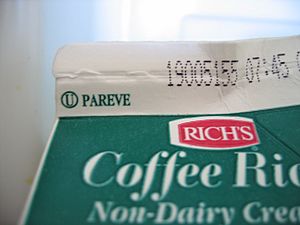Kosher tax conspiracy theory facts for kids
The "Kosher tax" is a false idea. It claims that food companies and shoppers are forced to pay money. This money supposedly supports Judaism or groups that support Israel. This idea is usually seen as a conspiracy theory. It is also called an antisemitic canard, which is a harmful lie about Jewish people.
Many people disagree with this idea. They point out that people who buy kosher foods are not just Jews. They also include Muslims, Seventh-day Adventists, and others. Because of this, food companies often want kosher certification. It helps them sell more products and make more money. The fees for certification help the groups that do the checking. Also, the extra sales from being certified often make up for the cost. This means the certification does not always raise prices. It might even make products cheaper per item.
What is the Kosher Tax Claim?
The "kosher tax" conspiracy theory says that kosher certification adds a hidden tax. This tax is supposedly collected from shoppers without them knowing. It is then used to help Jewish groups. This claim is mostly spread by groups that are antisemitic. These are groups that are against Jewish people. It is also spread by white supremacist and other extremist groups. It is known as a harmful lie or an urban legend.
Some similar claims say that this "Kosher tax" is "forced" from food companies. They say companies pay to avoid a boycott. A boycott is when people stop buying from a company. The money is then supposedly used to support groups that help Israel.
A professor named Kathleen M. Blee studied racist groups. She reported that some of these groups tell people to avoid kosher products. They do this to avoid paying this "Jewish tax."
The Claim in Canada
In 2000, a group called B'nai Brith Canada looked into antisemitic acts. They found that some people were told to ask for a refund on their income tax. They were told to say they had paid a "kosher tax."
In 1997, the Canada Revenue Agency spoke out. They said flyers were telling people to claim a tax deduction. These flyers said people had "contributed to a Jewish religious organization" when buying groceries. The Minister of National Revenue, Jane Stewart, said this idea was "deeply offensive." She also said that this "deduction" does not exist. She told all taxpayers to ignore this false advice.
During an election in Quebec in 2014, a politician named Louise Mailloux spoke about kosher certification. She said that kosher and halal certification was a religious tax. She claimed it was used to fund religious wars and make religious leaders rich. A Jewish group asked her party to correct this "urban legend." But the party leader, Pauline Marois, defended her.
Why the Claim is False

Companies choose to get kosher certification. The cost of this is usually very small. The benefits of being certified are much bigger. For example, in 1975, the cost per item for one company was tiny. It was so small it barely added anything to the price.
Getting certified helps companies sell more products. It opens up new markets to many different groups. This includes Jews who eat kosher food. It also includes Muslims who eat halal food. Seventh-day Adventists also look for certain foods. Vegetarians and people who cannot have dairy also benefit. Products certified as pareve are dairy-free.
A commission in Quebec looked into the "kosher tax" claim in 2008. They said that "the most fanciful information" was spreading. They found no proof that kosher certification made prices go up. They also found that rabbis did not make much money from giving certification.
Experts say that the cost of kosher certification is like an advertising cost. It is not a cost of making the product. People who explain why the "kosher tax" is false say this: If it did not help companies make money, they would not do it. The extra sales from being kosher certified actually make the cost per item lower. One expert, Avi Shafran, added that if a kosher item costs more, shoppers can just buy a non-kosher one.
Getting kosher certification is a business choice. Companies make this choice to get more sales. Both Jewish and non-Jewish shoppers look for kosher certification. The fees for kosher certification help the groups that do the checking. They do not go to "some special Jewish fund" to support Israel.
 | Janet Taylor Pickett |
 | Synthia Saint James |
 | Howardena Pindell |
 | Faith Ringgold |

